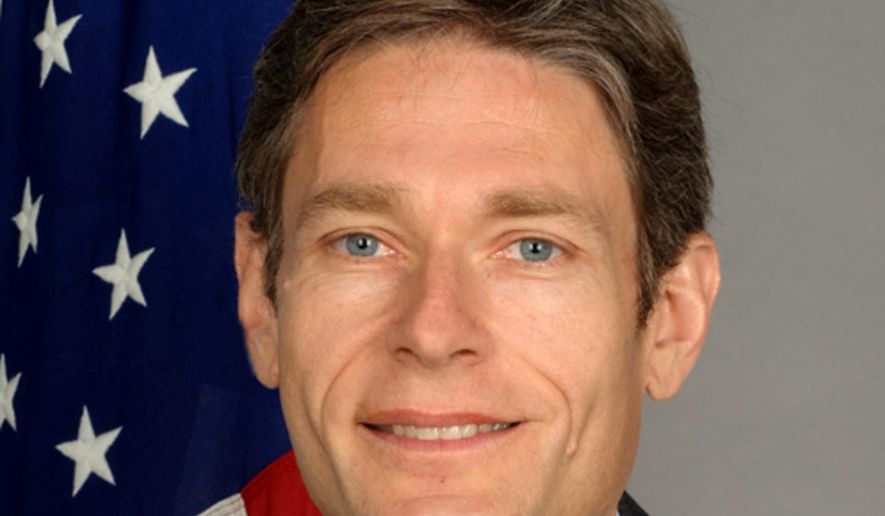ANALYSIS/OPINION:
In September 2009, a Polish newspaper headline screamed, “Stabbed in the Back.” The occasion was the United States announcing the cancellation of a plan to install ground-based interceptor missiles in Poland — an effort the Poles had undertaken in good faith on American advice and at some risk, now canceled without consultations and announced with incredible insensitivity on the anniversary of the Soviet invasion of Poland.
Hundreds (if not thousands) of people at the CIA now know how the Poles must have felt.
Last week in Geneva, Tom Malinowski, assistant secretary of state for democracy, human rights and labor, told the U.N. Committee Against Torture: “A little more than 10 years ago, our government was employing interrogation methods that, as President Obama has said, any fair-minded person would believe were torture.”
Indeed, in response to a question near the end of an hourlong press conference in early August, Mr. Obama did use that word. “We tortured some folks,” he said.
But those remarks were extemporaneous, almost casual, and wrapped in a warning not to be too judgmental, given the circumstances after 9/11.
SEE ALSO: White House taunts GOP on climate change: ‘I don’t believe they can stop us’
In Geneva, Mr. Malinowski was speaking from a prepared statement in front of foreign officials ready to stand in judgment of the United States. Before assuming his State Department post, Mr. Malinowski had spent more than 10 years as the head of the Washington office for Human Rights Watch, and there he was a principled opponent of CIA detentions and interrogations. In frequent, often thoughtful, commentary, he routinely characterized U.S. behavior as torture.
Last week, though, he spoke as a representative of the U.S. government.
With Mr. Malinowski’s statement in hand, the U.N. Committee pressed the Americans on investigating what had apparently just been admitted, namely torture.
When the American delegation pointed to John Durham’s yearslong investigation into the CIA’s interaction with every CIA detainee — an investigation whose results (no prosecutions) might have suggested that the original American statement was perhaps unnecessary — committee members questioned why Mr. Durham had not interviewed detainees (i.e., the terrorists the CIA had captured!). You got the sense from the committee members that this remained unfinished business.
After he finished his remarks, Mr. Malinowski introduced Mary McLeod, the State Department’s acting legal adviser. Ms. McLeod called the committee’s attention to the pending release of Sen. Dianne Feinstein’s report on CIA detentions and interrogations, praising it as a “detailed congressional investigation” and an example of American transparency.
This would be the report that the CIA — that’s Mr. Obama’s CIA — believes is historically inaccurate, analytically flawed and far more prosecutorial than objective. That’s the same report that, with four years’ preparation, could not see its way clear to interview any CIA officer involved in the program.
SEE ALSO: State Department cyber attack prompts shutdown of email system
There is also no record that the American delegation recommended that the U.N. Committee read the CIA’s or the Republican minority’s rebuttal to the Feinstein document.
It’s unclear what legal impact these characterizations might have. Some European countries claim universal jurisdiction for their laws, and although unrelated to the events in Geneva, Spain’s National Court last week upheld a Spanish investigation into alleged torture at the U.S. military detention center at Guantanamo Bay, Cuba.
Was there any thought given to what effect a formal statement like this might have on this or on the International Criminal Court in The Hague? And what about the civil suits that these comments will inspire or reinforce?
There is also the European Court of Human Rights’ allegations of Polish complicity in what that court claims was American torture. How will American statements in Geneva affect that, especially Poland’s claims of state secrets with regard to documents that the court has demanded?
It would be a bad thing if these potential consequences were not thought through before the statements in Geneva. It would be an even worse thing if they were.
And then there is the question of the CIA and its officers, the folks who stepped into the breach after 9/11 and far more out of duty than enthusiasm stepped up to do what the president, the Department of Justice and congressional overseers thought was necessary and lawful.
Now a senior official of their own government has apparently just baited the hook for international bodies to come after them. What are they to think?
Their first question, no doubt, will be whether their own agency cleared the Geneva talking points. From all indications I have seen, the agency did not (which raises another whole series of issues).
Then they will want to know what physical and legal protections they have a right to expect from the government they have served and on whose behalf (and instructions) they did what they did. That is not yet clear.
Finally, those carrying out today’s covert actions for today’s president will wonder at what forum by what U.S. government spokesman their current actions will be disowned by the government they now serve. It’s entirely possible that some State Department official in the future will consider that vaporizing a suspected terrorist outside of an internationally agreed theater of conflict is actually worse than keeping a known terrorist awake for a very long time.
It could happen.
Stabbed in the back is a strong metaphor, maybe too strong. Then again
• Gen. Michael V. Hayden is a former director of the CIA and the National Security Agency. He can be reached at mhayden@washingtontimes.com.
• Mike Hayden can be reached at mhayden@example.com.




Please read our comment policy before commenting.